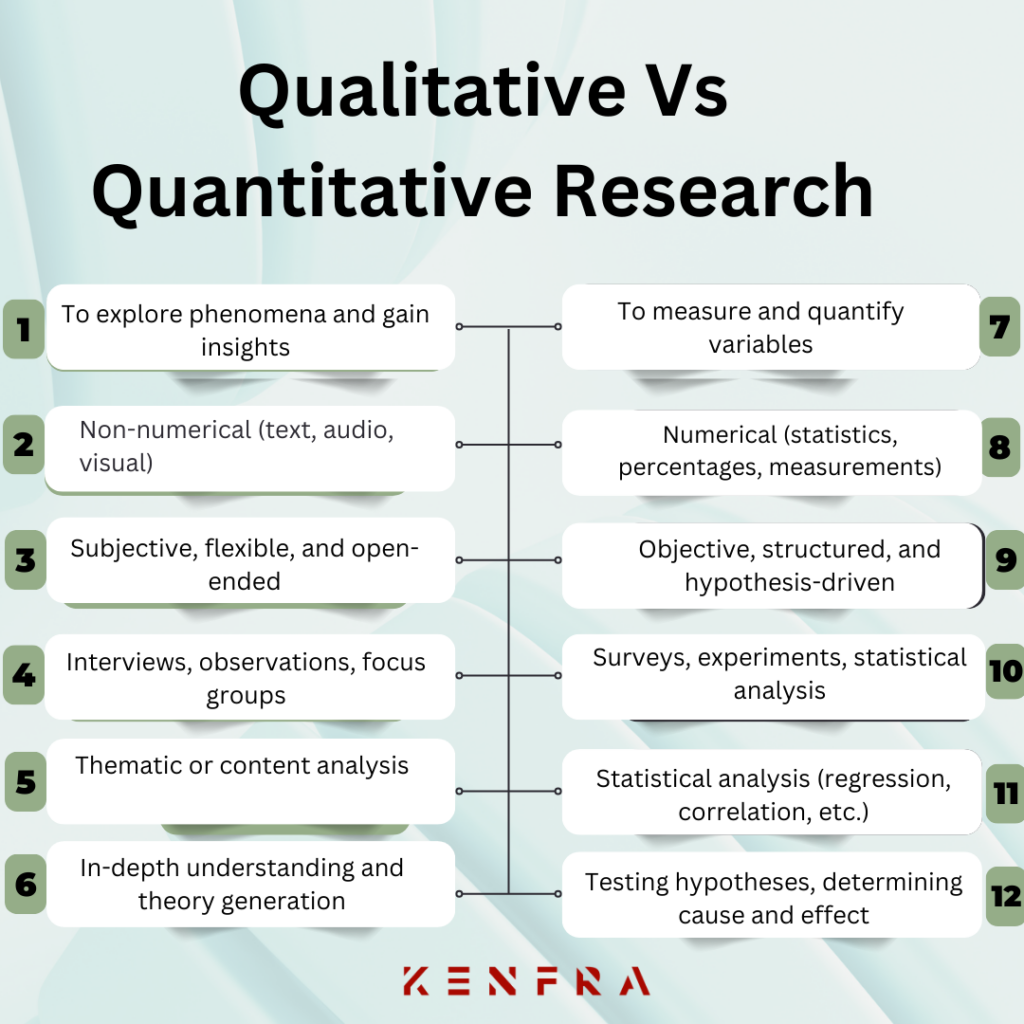Qualitative vs. Quantitative Research: Choosing the Right Approach
mahisha mani2024-11-29T16:53:40+05:30What is Qualitative Research?
Qualitative research is a method used to explore complex human experiences and social phenomena. It focuses on gaining an in-depth understanding of individuals’ perceptions, feelings, and motivations. This approach typically involves gathering non-numerical data through:
- Interviews
- Focus groups
- Observations
- Case studies
- Ethnographic research
The goal of qualitative research is to uncover the underlying reasons, opinions, and motivations behind behaviours or events. For example, researchers might conduct interviews with participants to understand how they perceive a particular social issue or their experiences with a product.
Key Features of Qualitative Research:
- Data Type: Non-numerical (words, images, etc.)
- Approach: Subjective, exploratory, and interpretive
- Focus: Understanding experiences and behaviours in depth
- Outcome: Provides detailed insights and generates hypotheses
Examples of Qualitative Research:
- Understanding consumer emotions towards a brand.
- Exploring societal trends and their impacts on behaviour.
- Investigating organizational culture or employee experiences.
What is Quantitative Research?
Quantitative research relies on numerical data to identify patterns, test theories, and make predictions. This method is more structured and focuses on quantifying variables. Researchers collect data through:
- Surveys
- Experiments
- Statistical models
- Observational data
The goal of quantitative research is to measure and analyze relationships between variables and test hypotheses. For example, researchers might use surveys to quantify consumer satisfaction levels or analyze the effect of a marketing campaign on sales numbers
Key Features of Quantitative Research:
- Data Type: Numerical data (statistics, measurements)
- Approach: Objective, systematic, and structured
- Focus: Measuring relationships between variables or testing hypotheses
- Outcome: Provides statistical evidence and conclusions
Examples of Quantitative Research:
- Analyzing the effectiveness of a marketing campaign.
- Measuring the impact of exercise on physical health.
- Comparing test scores of two groups to evaluate a new teaching method.
Qualitative Vs Quantitative Research

Choosing the Right Approach: When to Use Qualitative vs. Quantitative Research
When to Use Qualitative Research:
- Exploratory Research: When you are in the early stages of a study and need to understand the underlying motivations and perceptions.
- Understanding Context: To gain deeper insights into individual behaviors, experiences, and social contexts.
- Complex Phenomena: When studying complex, subjective experiences that are difficult to quantify, such as emotions, beliefs, and opinions.
When to Use Quantitative Research:
- Testing Hypotheses: When you have a specific theory or hypothesis that you want to test with numerical data.
- Measuring Variables: To quantify relationships between variables and make generalizations about a population.
- Statistical Analysis: When you need to analyze large data sets and provide statistical evidence of trends, patterns, or correlations.
Can You Combine Both Approaches?
In many research studies, a mixed-methods approach is used, which combines both qualitative and quantitative research. This approach allows researchers to gain a more comprehensive understanding of a problem by leveraging the strengths of both methods. For example, qualitative research might be used to explore user experiences, while quantitative research can measure the effectiveness of a product or service based on numerical data
Conclusion: Making the Right Choice for Your Research
Choosing between qualitative and quantitative research depends on your research goals, the nature of the problem, and the type of data you need to gather. Qualitative research is best for exploring and understanding complex human experiences, while quantitative research excels in measuring and testing relationships between variables. In some cases, combining both methods provides the most comprehensive insights.
When in doubt, consider the research questions you’re trying to answer and the outcomes you hope to achieve. With the right approach, you can ensure your research is effective, insightful, and capable of driving meaningful conclusions.
Need help choosing the right research method for your study? Contact Kenfra today for expert guidance on designing the perfect research strategy for your needs!










Leave a Reply